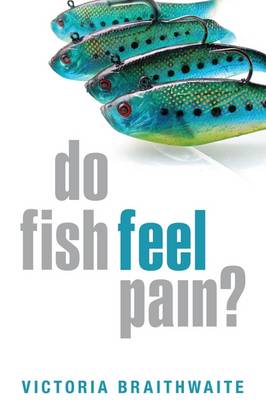By Kirsty McHugh, OUP UK
Victoria Braithwaite, Professor of Fisheries and Biology at Pennsylvania State University, is the author of Do Fish Feel Pain?, which publishes in the UK later this month. In it she engages with the latest research on fish pain and suffering, explaining what we now understand about fish behaviour. In the original post below, she looks at the behaviour of coral reef cleaner fish, who remove skin parasites from client fish. But the cleaner-client relationship is rife with deception and reprimand – and even a battle of the sexes.
If you’ve ever had an itch that you couldn’t scratch, then you’ll understand what drives this quirky example of animal cooperation. Under the aquamarine surface of tropical seas, coral reef fish literally line up to be tended by one or a pair of small, striped cleaner fish. Without limbs or fingers, big fish have a tricky time removing parasites on their skin and fleshy gills. The small cleaner fish provide the solution: they bite off any crustacean parasites they find. It seems to be a simple arrangement. The client fish are cleared of their irksome parasites and the cleaner fish get a meal. But things are not always what they seem.
Cleaner fish are not just interested in parasites. They actually prefer mucus, the protein rich secretion that covers a  fish and makes them feel slimy to us. From time to time cleaners cheat by taking a bite, not at a parasite, but out of their client. Client fish don’t like this at all and visibly shudder. Client fish have found that the best way to punish cheating cleaners is to swim away and avoid that cleaner in the future.
fish and makes them feel slimy to us. From time to time cleaners cheat by taking a bite, not at a parasite, but out of their client. Client fish don’t like this at all and visibly shudder. Client fish have found that the best way to punish cheating cleaners is to swim away and avoid that cleaner in the future.
Intriguingly, it turns out that the relationship between the cleaner and client isn’t just restricted to any pairing, but in fact a whole communication network can become established with cleaner reputations being lost or gained. Some cleaners work at specific places on the reef, known as stations. The clients learn to approach these areas and wait for their turn to be serviced. Fish waiting in line for the cleaner’s attention keep a wary eye on the client in front, and if they see it shudder, they too will swim away in search of another station with a more cooperative cleaner. Cleaner fish that get too greedy lose their clients and their reputation.
A further twist to this tale has just been discovered. Researchers working in the Red Sea have reported that cleaner stations with a paired male and female are more cooperative and cheat less than stations with a solo cleaner. What makes these pairs different? It turns out that the male cleaner actually polices the honesty of the female cleaner, chasing and harassing her if she munches on mucus. Males punish the females, even though the client was the victim, because males need satisfied clients. On average the male gets more food when a client remains at a station until the cleaning operation is complete.
There is much in this tale. Clearly fish are smarter than we could have imagined. They can make and lose reputations. They can learn from the experience of others. They can cooperate as business partners – by force if need be. Who would have thought that such a beautifully simple business model would turn out to be a hotbed of cheating, reprima


